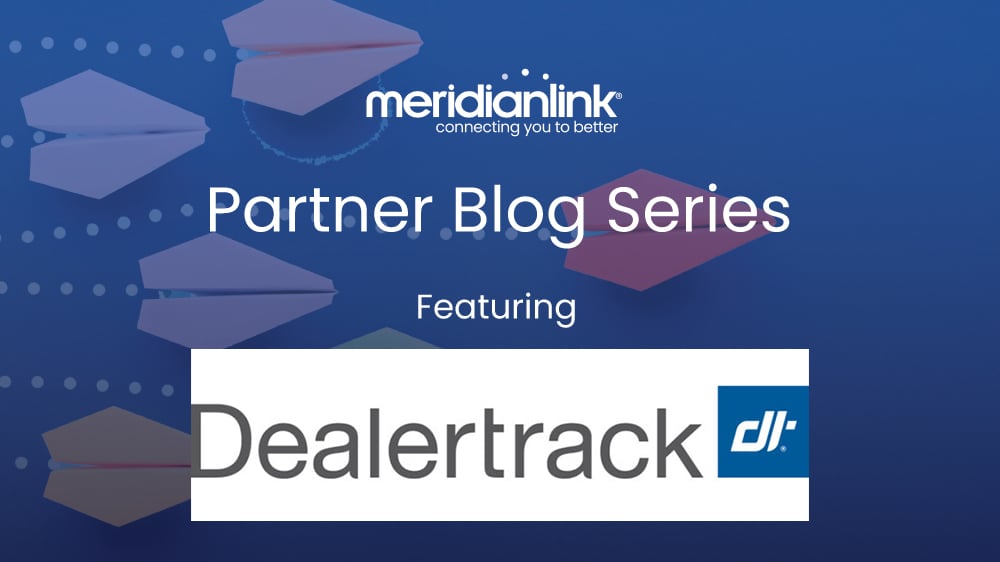The following post is part of a series of blogs written by MeridianLink Partners who will be attending the MeridianLink LIVE! User Forum in May 2022. To learn more about the event, click here.
By: Dealertrack
“No one will ever buy those online.” That used to be the conventional wisdom about clothes and home furnishings, yet eCommerce sales of both apparel and furniture increased by more than 20% in 2021.1 Consumers who used to feel strongly about seeing, touching, and trying out these items before purchase chose convenience (backed by reasonable return policies) and made the leap to online shopping.
The reality is that consumer preferences are driving a major shift in automotive retail toward eCommerce vehicle transactions. Research shows that 76% of today’s car buyers are open to buying completely online,2 although consumers still need some time to get used to purchasing vehicles that way. With 28.9 million auto loan originations projected for 2022 alone,3 lenders must evolve their processes to give consumers the ability to purchase vehicles anytime, anywhere—just like the other items they buy online.
Give Consumers What They Want
As we all know, the pandemic accelerated the shift to digital adoption due to increased demand for online purchase steps. Retailers quickly adopted digital retailing solutions to help facilitate vehicle purchases, including online F&I aftermarket products and remote contract review and signing. While these digital solutions improved the car buying journey, the overall sales experience was not fully automated.
The financing process is one of the remaining digital capabilities that can create a fully automated eCommerce experience. A fully automated eCommerce sales channel allows for transactions to take place 24/7/365, with pricing transparency to ensure that payment calculations reflect aftermarket selections and help give car buyers confidence in the affordability of their selections.
Auto Financing Through Lenders Remains As Important As Ever
As underwriters of the $1.46 trillion in auto loan debt held in the U.S.,4 lenders play an integral role in supporting the auto retailing ecosystem. Nearly half of all consumers that have an auto loan or lease researched financing options — and many decisions are based on an affordable monthly payment. Through automation, lenders can work with retailers to deliver this much desired consumer experience that can trigger a click-to-buy reaction.
Lenders and retailers should also look to an eCommerce solution that safeguards against identity theft and fraud. Last year saw automotive loan fraud increase to $7.7 billion5 as stimulus funds dried up and employment fraud, income misrepresentation and use of synthetic identities grew. Automation combined with AI capabilities — one that offers multiple points of ID verification with facial recognition and other elements relative to government-issued IDs — mitigate human error and risk to protect against fraudulent activity.
Now, as the availability of remote signing technology expands in support of this eCommerce evolution, Cox Automotive Lender Solutions Strategist Andy Mayers shares these important next steps for lenders: “Lenders need to invest in the technologies that will drive their own efficiencies, such as alternative deal structures, stipulation management and lights-out funding. Understand it’s not just the retailer participating in the financing transaction; frictionless processes are critical for both lenders and retailers delivering the experience behind it.”
The ideal fully automated eCommerce solution will help lenders efficiently fund deals during the F&I stage of the consumer’s buying journey. The key is matching the right buyer with the right car and right financing structure, while improving look to book, and enhancing risk and fraud prevention. Leveraging automation, lenders can achieve lights-out funding, gain a new origination channel, deepen retailer partnerships, and acquire new consumers.
The Future Of F&I For Automotive Retail
With increased acceptance of digital contracting and remote signing, the seeds are already sown for fully online eCommerce transactions. Transforming to a fully online eCommerce channel takes time and requires a strong vision. Completing the necessary groundwork today will help make fully automated eCommerce successful and profitable going forward.
Sources:
1eMarketer Insider Intelligence, “US Ecommerce Forecast 2021,” July 8, 2021
2Cox Automotive Digitization of End-to-End Retailing Study (2020)
3TransUnion Financial Services 2022 Consumer Credit Forecast
4Federal Reserve Bank of New York Household Debt and Credit Report, February 8, 2022
5Point Predictive 2022 Auto Fraud Trends Report






